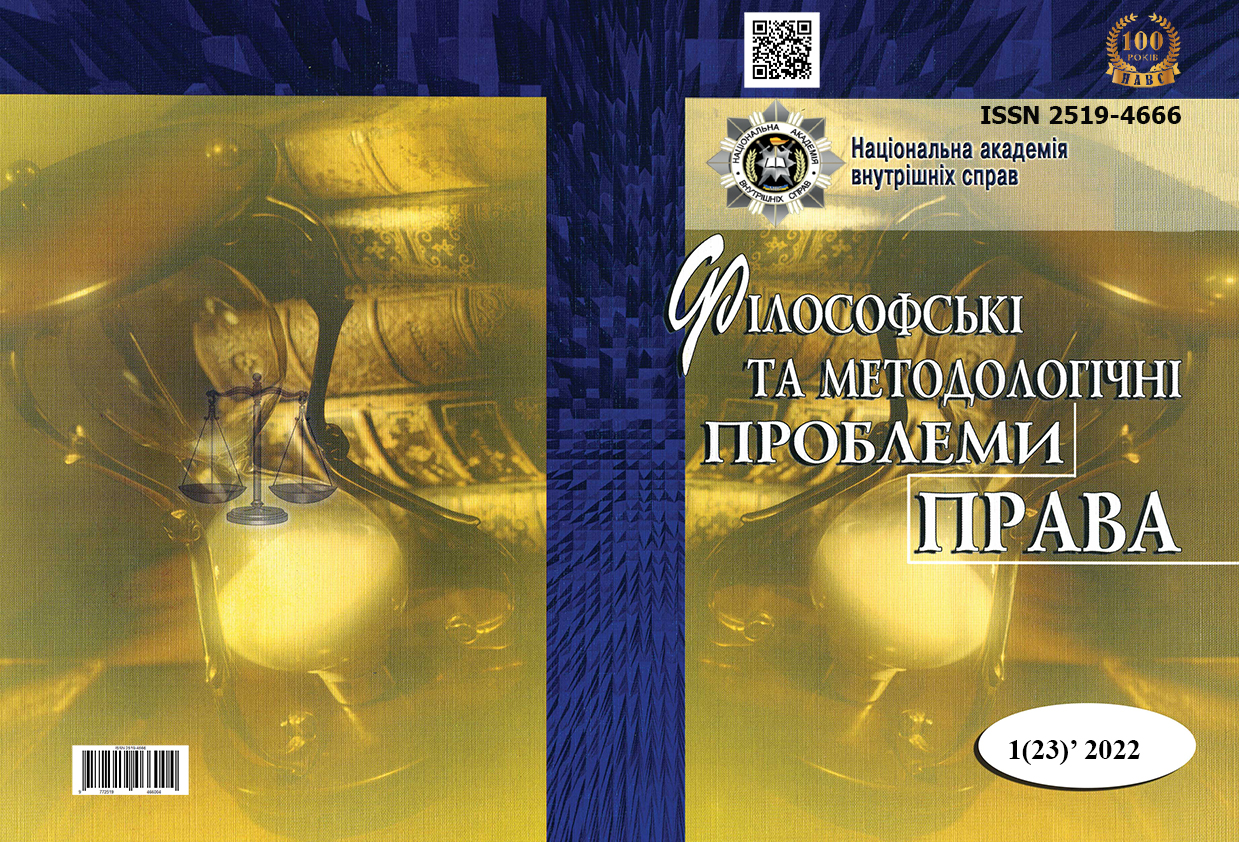State Regime of the Russian Federation: Separate Political and Legal Dimensions
Abstract
Taking into account the approaches formed by the national legal doctrine to determine the essence and content, classifications of the state political and legal regime, an attempt was made to determine the features and determinants of the modern state regime of the Russian Federation. It is emphasized that the latter arose as a result of the transformation of the USSR regime and now simultaneously has signs of both a totalitarian and democratic regime, followed by the strengthening of the features inherent in classical totalitarianism. The research methodology is a set of scientific methods, including general scientific and special methods of cognition, namely: formal-logical, system-functional, comparative-legal, etc. According to the classical doctrinal approach, political and legal regimes are divided into democratic and anti-democratic – totalitarian and authoritarian. The practice of state-building testifies to the absence of pure forms and the existence of regimes that actually combine the features of several of them. Sometimes these modes are called hybrid modes. It is emphasized that at the constitutional level in the Russian Federation all the so-called attributes of a democratic state are enshrined, which declare and should have formed and determined the essence of the state regime in the country. The practice of state-building, due to a number of objective and subjective factors, determined the peculiarities of the Russian state regime: the absence of a strong civil society that cannot really influence the adoption of political or legal decisions, protect their interests; the values of Russian Orthodoxy, as traditional, are proclaimed as part of the state ideology; the lack of the right to opposition and independence of the court; excessive concentration of power and increasing the authority of the head of the country; increasing the role of special services, the purpose of which is to protect the regime; increasing the top of state power and big business; weakness of authoritative political elites, manifested in their inability to produce patterns of behavior, to be a source of progress, etc.
Keywords: anti-democratic regime; totalitarianism; Russian Federation; state formation; political and legal regime; ideology; extremism; international law.
Downloads
References
Bukhanevych O. M., Mernyk A. M., Petryshyn O. O. Approaches to Understanding the Category «Special Legal Regimes». Journal of the National Academy of Legal Sciences of Ukraine. 2021. Vol. 28. No. 1. Р. 71–78. DOI: https://doi.org/10.37635/jnalsu.28(1).2021.71-78.
Мокін І. С. Взаємодія форми правління та політичного режиму Української Держави гетьмана П. П. Скоропадського. Актуальні проблеми політики. 2013. Вип. 48. С. 468–477.
Шаповал В. М. Режим політичний. Юридична енциклопедія : 6 т. / [редкол.: Ю. С. Шемшученко (відп. ред.) та ін.]. Київ : Укр. енцикл. ім. М. П. Бажана, 2003. Т. 5 : П–С. 736 с.
Лемак В. В., Попович Т. П. Державний режим як теоретико-правова категорія (поняття, критерії для видової класифікації). Публічне право. 2014. № 4 (16). С. 177–182.
Kovalchuk V. B., Zharovska I. M., Gutiv B. I., Melnychenk B. B., Panchuk I. O. Human Rights and Positive Obligations of the State. Journal of the National Academy of Legal Sciences of Ukraine. 2021. Vol. 28. No. 3. Р. 27–35. DOI: https://doi.org/10.37635/jnalsu.28(3).2021.27-35.
Головатий М. Ф. Право і політика як базові засади організації і діяльності органів державної влади. Право в сучасному політичному житті країни. 2020. С. 280. DOI: https://doi.org/10.37374/2020-37-21.
Волинець В. В. Функції сучасної держави: теоретико-правові проблеми : монографія. Київ : Логос, 2012. 509 с.
Про внесення змін до деяких Законів України щодо засудження ідеології «руського міра» : пояснювальна записка до проекту Закону України від 17 берез. 2021 р. № 5258. URL: http://search.ligazakon.ua/l_doc2.nsf/link1/GI04664A.html.
Арендт Х. Истоки тоталитаризма. М. : ЦентрКом, 1996. URL: http://krotov.info/libr_min/01_a/re/ndt_18.htm.
Skrypnuk O. V., Parkhomenko N. M., Оnishchenko N. M. Awareness in Law as Strategical Direction of Legal Policy. Journal of Advanced Research in Law and Economics. 2019. Vol. 10. No. 5 (43). Р. 1534–1540.
Кузніченко С. О. Народовладдя та надзвичайні правові режими: постановка проблеми. Новий шлях до права : монографія. Київ : Логос, 2021. С. 82–82.
Ляхович В. Політичний режим «керованої демократії» в Росії: сучасні виклики трансформаціям. Віче. 2012. № 4. URL: https://veche.kiev.ua/journal/2983/.
Обушний М. І., Коваленко А. А., Ткач О. І. Політологія : довідник / за ред. М. І. Обушного. Київ : Довіра, 2004. 316 с.
Honcharenko V. D., Shyhal D. A., Omarova A. A. Legal Status of the Union Republics During the Rebuilding (1985–1991). Journal of the National Academy of Legal Sciences of Ukraine. 2022. Vol. 29. No. 1. Р. 39–49. DOI: 10.37635/jnalsu.29(1).2022.39-49.
Кушнарьов І. В. Політична корупція: порівняльно-політологічна концептуалізація : монографія. Київ : Юрид. думка, 2018. 408 с.
Abstract views: 1676 PDF Downloads: 318
Copyright (c) 2022 Philosophical and Methodological Problems of Law

This work is licensed under a Creative Commons Attribution-NonCommercial-NoDerivatives 4.0 International License.
- Authors reserve the right to authorship of their own work and transfer to the magazine the right of the first publication of this work under the terms of the Creative Commons Attribution License, which allows other persons to freely distribute published work with mandatory reference to authors of the original work and the first publication of an article in this magazine.
- Authors have the right to enter into separate additional agreements on non-exclusive dissemination of the work in the form in which it was published in the journal (for example, to post an article in the institution's repository or to publish as part of a monograph), provided that the link to the first publication of the work in this journal is maintained.
- The journal's policy allows and encourages the posting of articles by authors on the Internet (for example, in electronic storehouses of institutions or on personal websites), both before the submission of this manuscript to the editorial office and during its editorial processing, as this contributes to the creation of a productive scientific discussion and positively affects the efficiency and dynamics of citing the published work.




